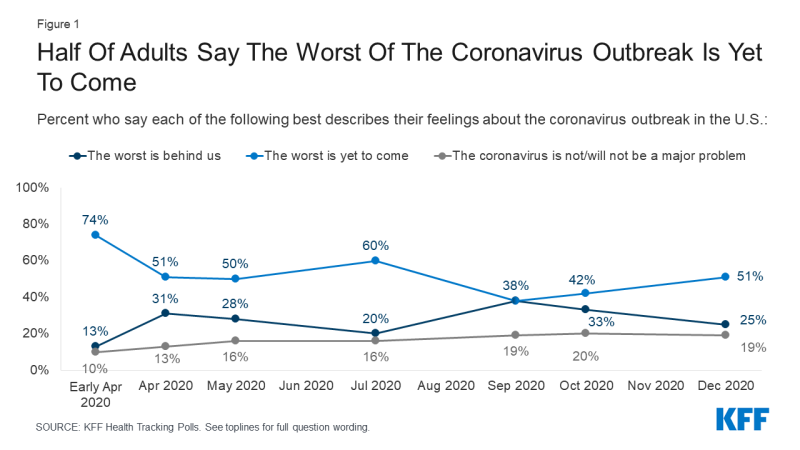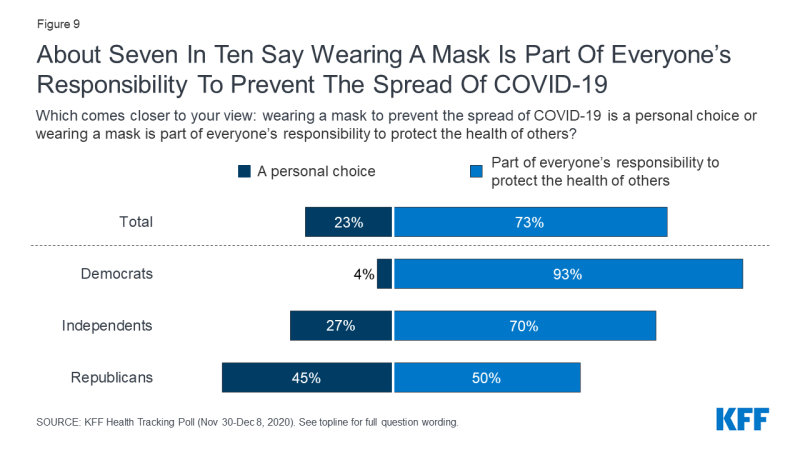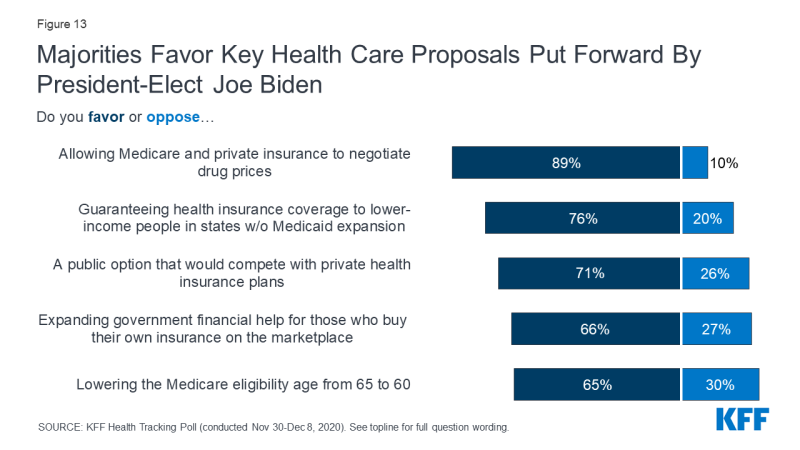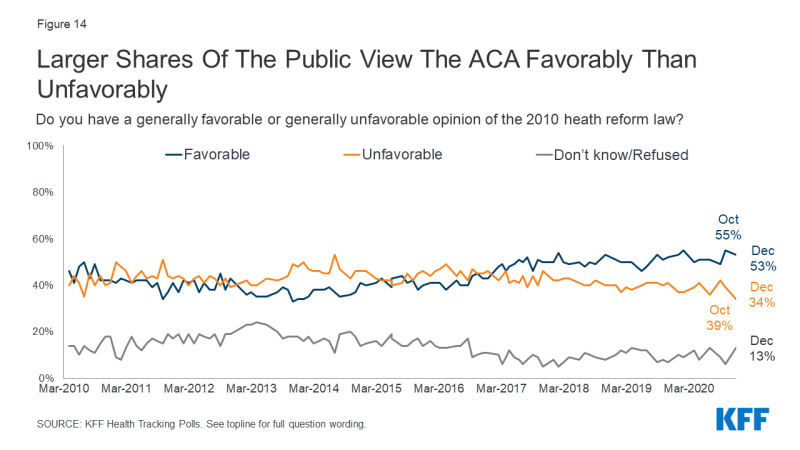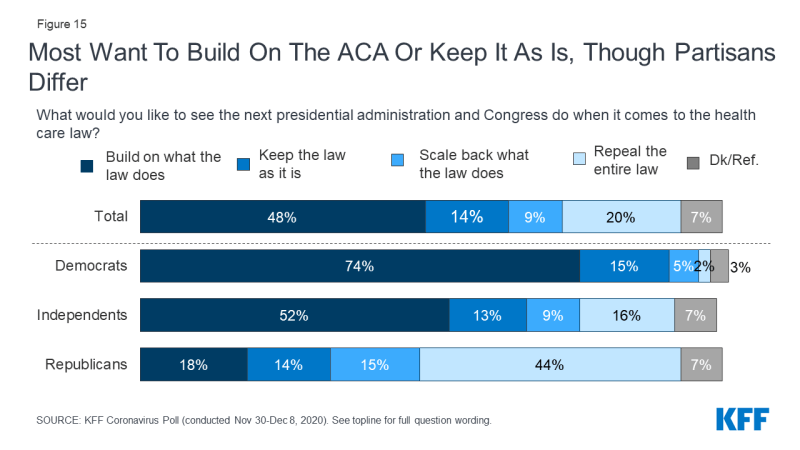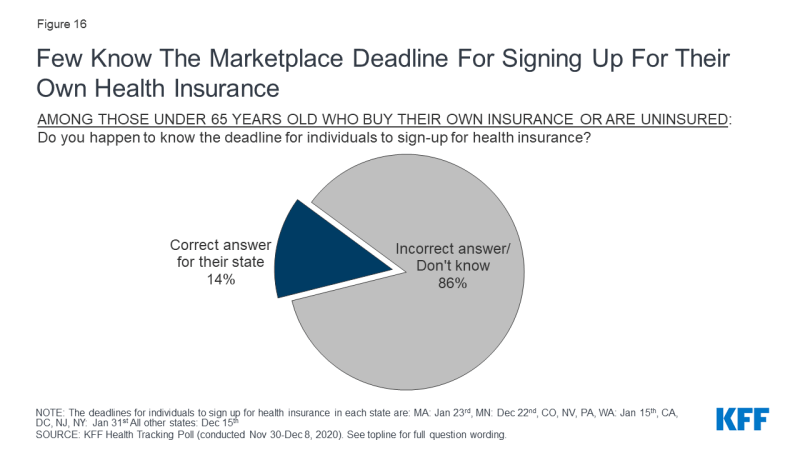KFF Health Tracking Poll – December 2020: COVID-19 and Biden’s Health Care Agenda
Key Findings
- As the country hits record numbers of cases, hospitalizations, and deaths, pessimism about the trajectory of the coronavirus pandemic continues to increase. Half of adults now say the worst is yet to come, returning to levels measured in May. Moreover, the share of the public who say they are worried that they or someone in their family will get sick from coronavirus is at its highest point since KFF began tracking this question in February (68%).
- With a COVID-19 vaccine on the horizon, most adults (70%) say they can continue adhering to social distancing guidelines for six months or more, or until a vaccine is widely available. As some states and localities impose new stay-at-home orders and place restrictions on some businesses in efforts to limit the spread of coronavirus, about four in ten adults think their state has about the right amount of restrictions on businesses and on individuals. About half of Democrats (49%) say their state does not have enough restrictions on businesses, while half of Republicans (50%) say their state has too many restrictions.
- Compared to May, a larger share now say they wear a mask every time they leave home (73%, up 21 percentage points since May, including increases across partisans and age groups).
- Reflecting the large share who say they consistently wear face masks, most of the public think wearing a mask to help prevent the spread of COVID-19 is part of everyone’s responsibility (73%), though Republicans are more divided with half saying it is everyone’s responsibility to help protect the health of others and 45% saying it is a personal choice.
- Majorities of the public want the incoming Biden administration and Congress to either build on the Affordable Care Act (ACA) or keep it as it is (62%), though partisans differ. There is bipartisan support for President-elect Biden’s proposal to allow the federal government to negotiate with drug companies to get a lower price on medications (89%). While majorities of the public favor guaranteeing health insurance coverage to lower-income people whose states have not expanded their Medicaid program (76%), establishing a public option (71%), expanding government financial help for those who buy their own insurance on the marketplace (66%) and lowering the Medicare eligibility age to 60 (65%), fewer Republicans are supportive of these proposals.
Growing Pessimism About The Coronavirus Outbreak
With coronavirus cases and hospitalizations at record highs across the country, the latest KFF Health Tracking Poll finds the public feeling increasingly negative about the trajectory of the pandemic. Half of adults (51%) think the worst is yet to come – an increase from September and October when about four in ten thought the worst was still ahead. One quarter of the public (25%) say the worst of the outbreak is behind us and about one in five say they do not think coronavirus is or will be a major problem in the U.S. (19%).
Among partisans, seven in ten Democrats (72%) say the worst is yet to come. Notably, about a third (32%) of Republicans now say the worst of the pandemic is yet to come, twice as many as in October (15%). Among independents, half say the worst of coronavirus is yet to come (50%) while 28% say that the worst is behind us. About six in ten Black adults (62%) – a group that has been disproportionally affected by coronavirus – say the worst of the coronavirus outbreak is yet to come while about half of White adults (53%) and four in ten Hispanic adults (41%) say the same.
The U.S. recently hit a COVID-19 daily death record, with more than 3,000 people dying from the disease in a single day. Three in ten adults say they are “very worried” they or a family member will get sick from coronavirus and a further 38% say they are “somewhat worried”. About eight in ten Democrats say they are worried they or a family member will get sick, including 42% who are “very worried”. While a majority of independents (68%) say they are at least “somewhat worried” that they or a family member will get sick from coronavirus, fewer than half of Republicans express this concern (46%).
Notably, about three in four Black adults (75%) and Hispanic adults (77%) say they are worried they or a family member will get sick from coronavirus while about two in three White adults (64%) express this concern.
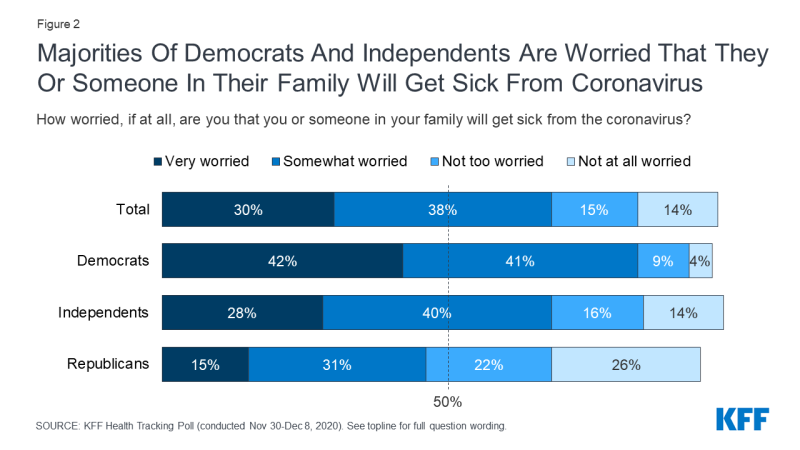
Figure 2: Majorities Of Democrats And Independents Are Worried That They Or Someone In Their Family Will Get Sick From Coronavirus
Amidst the worsening outbreak, the share of the public who say they are “very worried” or “somewhat worried” that they or someone in their family will get sick from coronavirus is at its highest point since KFF began tracking this question in February, with 68% now saying they are worried. The share of Democrats and independents who say they are worried they or a family member will get sick was similar in October but lower in April when slight majorities said they were worried (56% of Democrats, 54% of independents). Since early April, fewer than half of Republicans have said they are worried they or a family member will get sick from coronavirus.
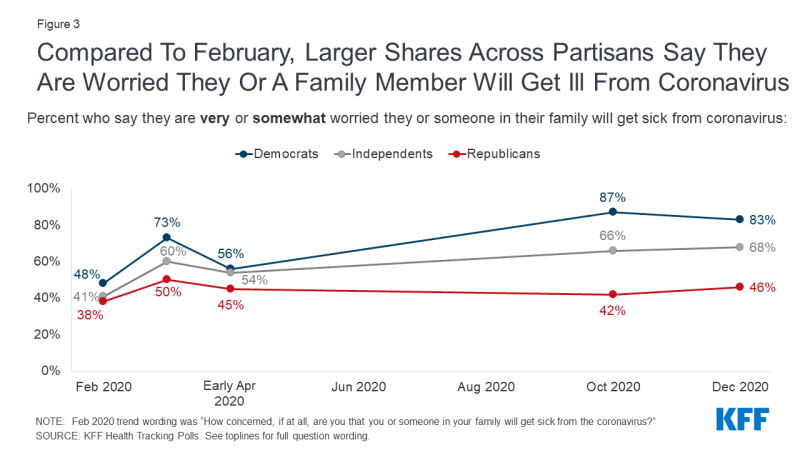
Figure 3: Compared To February, Larger Shares Across Partisans Say They Are Worried They Or A Family Member Will Get Ill From Coronavirus
Ten months after coronavirus began spreading through the country, half of adults (51%) say worry or stress related to the pandemic has had a negative impact on their mental health, including one in four who say it has had a major impact. This is similar to the share in July who said pandemic-related stress and worry had a negative impact on their mental health (53%), and higher than the share who said the same in May (39%). Women are more likely than men to say their mental health has been negatively impacted by the coronavirus outbreak (57% vs. 44%). Similarly, younger adults ages 18 to 29 are more likely than their older counterparts to say stress and worry about the pandemic has had a negative impact on their mental health. The economic impacts of the pandemic are also taking a toll as six in ten adults whose household lost a job or income due to the pandemic say stress and worry related to coronavirus has had a negative impact on their mental health.
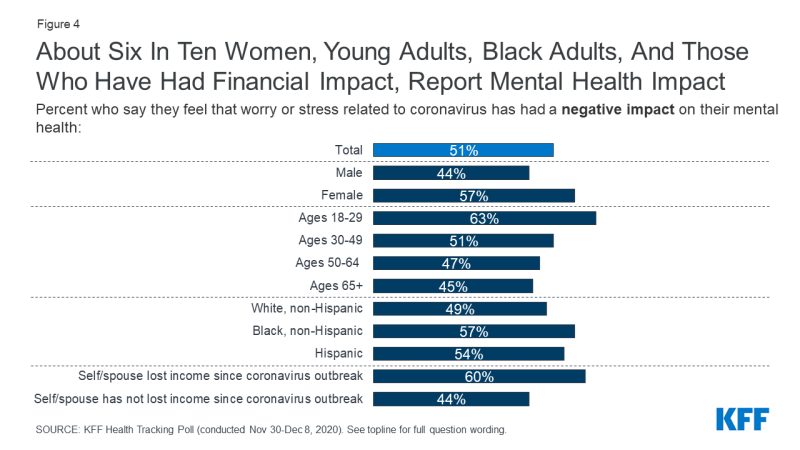
Figure 4: About Six In Ten Women, Young Adults, Black Adults, And Those Who Have Had Financial Impact Report Mental Health Impact
With the promise of a vaccine on the horizon, seven in ten adults say they can continue to follow social distancing guidelines for more than six months or until a vaccine is widely available. Majorities of Democrats (87%) and independents (68%) say they can keep following social distancing guidelines for another six months or longer or until a vaccine is available, and half of Republicans say the same. Notably, one in five Republicans say they cannot follow social distancing guidelines at all.
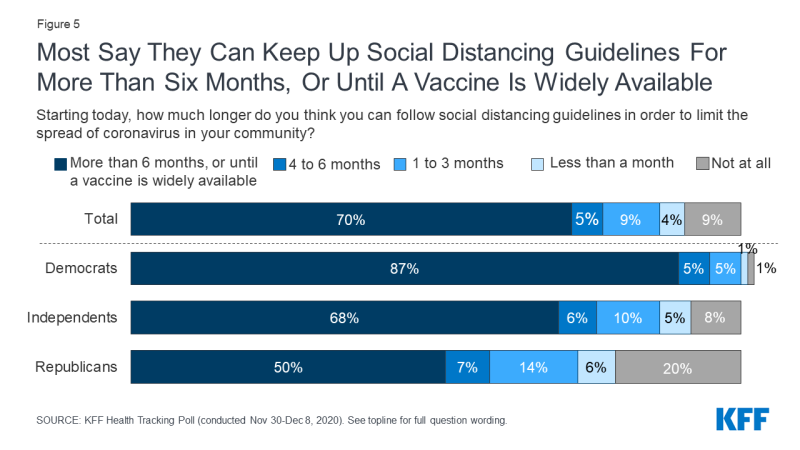
Figure 5: Most Say They Can Keep Up Social Distancing Guidelines For More Than Six Months, Or Until A Vaccine Is Widely Available
The reluctance of some Republicans to follow social distancing guidelines may stem from the perception that the seriousness of coronavirus is being exaggerated. Overall, the public is divided on whether news coverage of coronavirus is exaggerating its seriousness (35%) or presenting it correctly (36%), while one in four think the seriousness of coronavirus is underestimated (25%).
Partisans Are Divided On State Restrictions For Businesses, Individuals
In response to rising cases, some states and localities have instituted stay-at-home orders and placed restrictions on some businesses in an attempt to slow the spread of coronavirus. Four in ten adults say their state has about the right amount of restrictions on businesses (40%) and on individuals (42%) in its efforts to slow the outbreak. However, about a third of the public think their state does not have enough restrictions on businesses (32%) and individuals (36%), while one in four say their state has too many restrictions on businesses and one in five say there are too many restrictions on individuals.
There is a stark partisan divide on this issue. While about half of Democrats (49%) say their state does not have enough restrictions on businesses, a similar share of Republicans (50%) say their state has too many restrictions. Similarly, while a slight majority of Democrats (53%) say their state does not have enough restrictions on individuals in its efforts to limit the spread of coronavirus, about four in ten Republicans (43%) say their state has too many restrictions. Among independents, pluralities say their state has about the right amount of restrictions on businesses (45%) and on individuals (42%).

Figure 6: About Half Of Democrats Think Their State Currently Does Not Have Enough Restrictions On Businesses, Individuals
Larger Shares Of The Public Now Wearing Masks Every Time They Leave Home Than in May
Recent media coverage has highlighted the politicization of face mask use. Overall, about three in four adults say they wear a protective mask every time they leave their house and may be in contact with other people (73%). While large majorities across partisans – including three in four Republicans (76%) – say they use a mask at least “most of the time” they leave home, large shares of Democrats (87%), and independents (71%) say they wear a protective mask every time they leave their house, compared to fewer Republicans (55%).
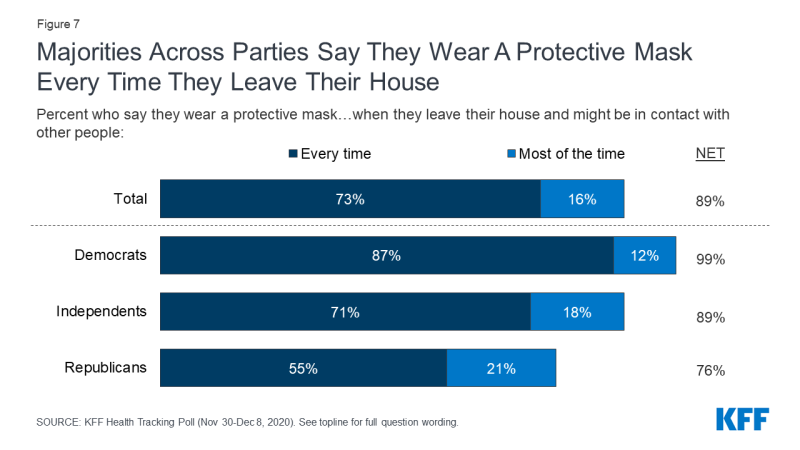
Figure 7: Majorities Across Parties Say They Wear A Protective Mask Every Time They Leave Their House
Compared to May, there has been a marked increase in the share of the adults who say they wear a mask every time they leave home. About three in four adults now say they wear a mask every time, up 21 percentage points since May. The share who say they wear a protective mask every time they leave home has increased by double digit percentage points across partisans and across age groups since May.
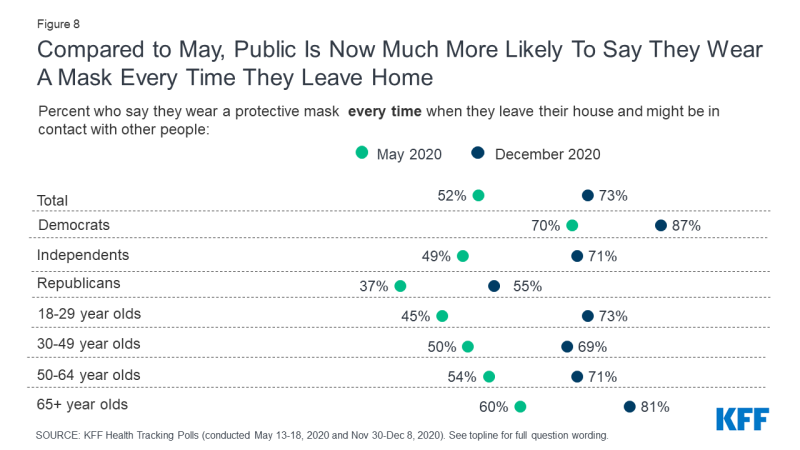
Figure 8: Compared to May, Public Is Now Much More Likely To Say They Wear A Mask Every Time They Leave Home
Who is not regularly wearing face masks?
With mask mandates in place in many parts of the country, most of the public say they are wearing masks at least most of the time they leave home and may be in contact with other people. However, a small minority of the public (11%) say they wear protective masks only some of the time of never. This group is disproportionately White (70%), male (65%), and Republican (54%), and is more likely to have no college education compared to those who report wearing masks more consistently.
The reported increase in consistent mask use reflects the attitude held by 73% of adults that wearing a mask to prevent the spread of COVID-19 is “part of everyone’s responsibility to protect the health of others.” While an overwhelming majority of Democrats (93%) and a large majority of independents (70%) say wearing a mask is everyone’s responsibility to protect public health, Republicans are more divided on this issue with half (50%) saying it is everyone’s responsibility and a similar share saying it is a personal choice (45%).
The view of mask wearing as a personal choice or a part of everyone’s responsibility appears related to personal mask use. Those who think wearing a mask to prevent the spread of COVID-19 is everyone’s responsibility are more than twice as likely as those who think it is a personal choice to say they wear a mask every time they leave their house and may come in to contact with others (85% vs. 37%).
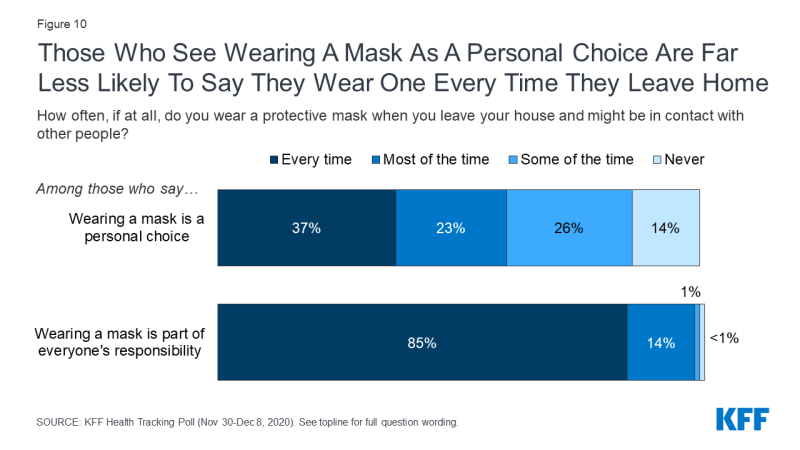
Figure 10: Those Who See Wearing A Mask As A Personal Choice Are Far Less Likely To Say They Wear One Every Time They Leave Home
Most of the public correctly knows that wearing a face mask can help limit the spread of coronavirus (78%) and that wearing a face mask is not harmful to your health (77%). Last month, the Centers for Disease Control stated that wearing a mask can help provide protection from the coronavirus for the wearer. Most adults think that is indeed the case with 70% saying a face mask helps protect them from coronavirus.
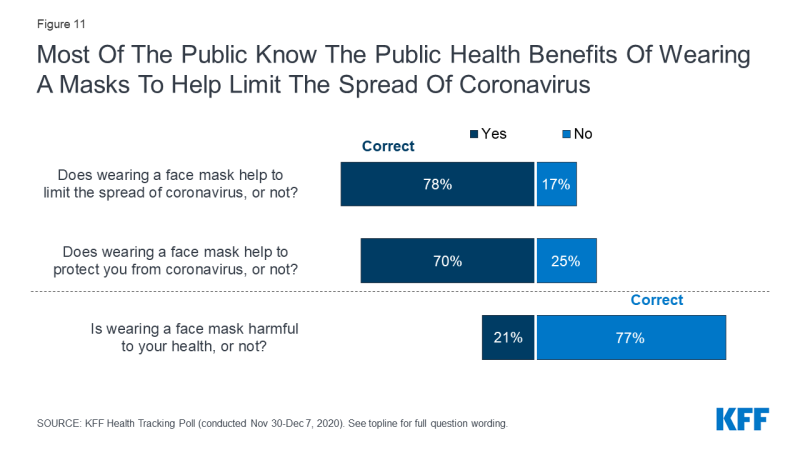
Figure 11: Most Of The Public Know The Public Health Benefits Of Wearing A Masks To Help Limit The Spread Of Coronavirus
Nonetheless, though most of the public knows these key facts about face mask use as a preventative measure against coronavirus, a third hold at least one misconception. Notably, a majority of Republicans (54%) hold at least one misconception about face masks, including 44% who say wearing a face mask does not help protect you from coronavirus. Among adults who believe at least one misconception about face masks, six in ten (61%) say they think the seriousness of coronavirus is being exaggerated and half say wearing a mask is a personal choice (50%).
| Table 1: Misconceptions of Coronavirus Face Mask Use by Party Identification | ||||
| Total | Party ID | |||
| Democrats | Independents | Republicans | ||
| Percent who believe in at least one misconception: | 34% | 14% | 38% | 54% |
| Percent who say: | ||||
| …wearing a face mask does not help protect you from coronavirus | 25 | 6 | 29 | 44 |
| …wearing a face mask is harmful to your health | 21 | 8 | 22 | 34 |
| …wearing a face mask does not help limit the spread of coronavirus | 17 | 4 | 19 | 33 |
President-Elect Biden’s Potential Health Care Agenda
While addressing the pandemic will undoubtedly be a top priority for the incoming Biden administration, there are other health care proposals – some of which have bipartisan support – that may also serve as cornerstones in Biden’s health care agenda.
Two health care priorities that have bipartisan support are price transparency and legislation aimed at curbing surprise medical bills. President Trump recently announced new transparency requirements which will require employer-based group health plans to disclose price and cost-sharing information to enrollees, and Congress is working on a bi-partisan bill to protect patients from surprise out-of-network medical bills. There is some hope that the legislation to address surprise bills will pass Congress before the end of the year. The latest KFF polling finds large majorities of the public – including majorities across partisans – favor making information about the price of doctors’ visits, tests, and procedures more available to patients (93%) and favor legislation aimed at protecting patients from high out-of-network surprise medical bills (80%).
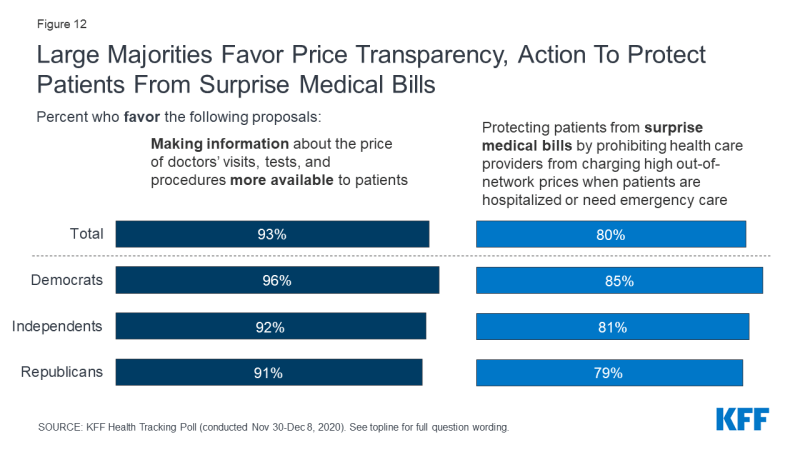
Figure 12: Large Majorities Favor Price Transparency, Action To Protect Patients From Surprise Medical Bills
Majorities of the public also favor many of the key health care proposals put forth by President-elect Joe Biden including large shares that favor allowing the federal government to negotiate with drug companies to get a lower price on medications that would apply to both Medicare and private insurance (89%). Support is high across partisans with more than eight in ten Democrats (97%), independents (87%) and Republicans (84%) supporting this proposal. A majority across partisans also favor guaranteeing health insurance coverage to lower-income people whose states have not expanded their Medicaid programs (76% overall, 95% of Democrats, 74% of independents, and 54% of Republicans). Overall, a majority also favor other aspects of President-elect Biden’s health care agenda asked about including about seven in ten overall who favor having a government-administered heath plan available as a public option to all Americans (71%), and about two-thirds who favor expanding government financial help for those who buy their own insurance on the marketplace (66%), and lowering the age when people become eligible for Medicare from 65 to 60 (65%).
However, Democrats and Republicans diverge on Biden’s proposals that are aimed at expanding health care coverage. While an overwhelming majority of Democrats (95%) favor guaranteeing health insurance coverage to lower-income people whose states have not expanded their Medicaid program, a smaller majority of Republicans (54%) support this proposal. Likewise, more than nine in ten Democrats support a public option compared to less than half of Republicans who say the same (92% vs. 45%).
Currently, most adults only qualify for Medicare health care benefits once they reach the age of 65. Nearly two-thirds of adults – including majorities of Democrats and independents and half of Republicans – favor Biden’s proposal to lower the age when people become eligible for Medicare from 65 to 60. While seven in ten adults ages 18 to 64 (70%) support lowering the Medicare eligibility age to 60, fewer than half of adults 65 and over (46%) favor this proposal.
| Table 2: Support for President-Elect Biden’s Proposed Health Care Policies | ||||
| Percent who say they favor each of the following health care proposals: | Total | Party ID | ||
| Democrats | Independents | Republicans | ||
| Allowing the federal government to negotiate with drug companies to get a lower price on medications that would apply to both Medicare and private insurance | 89% | 97% | 87% | 84% |
| Guaranteeing health insurance coverage to lower-income people whose states have not expanded their Medicaid program | 76 | 95 | 74 | 54 |
| Having a government-administered health plan, sometimes called a public option, that would compete with private health insurance plans and be available as an option to all Americans | 71 | 92 | 71 | 45 |
| Expanding government financial help for those who buy their own insurance on the marketplace | 66 | 84 | 64 | 48 |
| Lowering the age when people become eligible for Medicare from 65 to 60 | 65 | 79 | 61 | 51 |
Most Want To Build On The ACA Or Keep It As Is
In November, the Supreme Court heard arguments in the California v. Texas case challenging the constitutionality of the 2010 Affordable Care Act. The Trump administration submitted a brief in this case asking the Supreme Court to overturn the law. President-elect Joe Biden repeatedly voiced his support for the Affordable Care Act during his campaign and recently selected California Attorney General Xavier Becerra, who has been a strong defender of the ACA in court, as his pick for Secretary of Health and Human Services. The latest KFF Heath Tracking poll finds about half of the public (53%) have a favorable view of the ACA while 34% have an unfavorable view of the law.
Building on the ACA has been a focal point for Joe Biden’s presidential bid, as he has proposed creating a government-run public option health care plan that will compete with private insurers and be available for all Americans. Nearly half of adults want the incoming presidential administration and Congress to build on what the ACA does (48%). A smaller share want to keep the law as it is (14%) and about three in ten want to either scale back what the law does (9%) or repeal it entirely (20%). Partisans differ on these approaches, with three in four Democrats wanting the incoming administration and Congress to build on what the law does (74%) and six in ten Republicans wanting the law to be scaled back (15%) or repealed entirely (44%).
The Trump administration both shortened the open enrollment period for the ACA marketplaces and decreased funding for marketing and outreach efforts that publicize the enrollment period, eligibility, and process. With the enrollment deadline in many states having just recently passed and in other states quickly approaching, the latest KFF Health Tracking poll finds that just one in seven adults under age 65 who either buy their own insurance or are uninsured, and thus likely the target for ACA marketplace plans, are aware of the correct closing date for enrollment (14%). A possible action the incoming Biden administration may take to help further strengthen the ACA would be to restore funding for marketing and outreach to help Americans who want to buy their own insurance through the ACA marketplaces.

